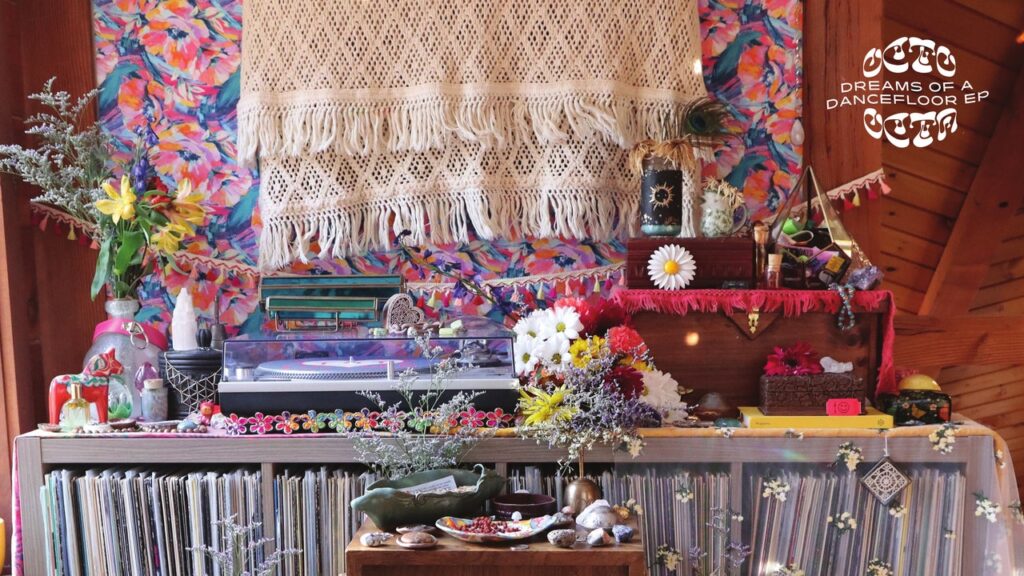
Maya Bouldry-Morrison sees music as a curative force, for both her audience and herself. “I deal with depression and anxiety,” she said in a recent interview, “but when I get out on the decks, I want to translate to the crowd why music is a healing technology. I’m not always successful, but I do it because I need to hear it first.” In the past, her therapeutic missives have taken the form of exuberant vocal samples. In live shows and earlier releases, her messages often came across in chopped-up monosyllables and joyful exclamations. More recently, she’s taken a leisurely, but no less reverential, approach: 2021’s She’s Calling EP ended with a winding meditation beckoning the listener to the woods. On her latest EP, Dreams of a Dancefloor, Bouldry-Morrison—better known as Octo Octa—imparts her dancefloor revelations largely without words, carefully building layered narratives from basslines and breakbeats.
Opener “Late Night Love” is an acid-house opera tracing a rowdy night out into the bleary-eyed bliss of a post-club cuddle puddle. The song starts with a buoyant synth tapping out a fervent rhythm, a hypnotic transmission that sounds like Gershon Kingsley’s “Popcorn” ushering you to the rave. Echoes of a breakbeat shuffle in the background, suggesting the feverish energy thrumming from inside the club as you wait in the line to enter. After an extended stretch of growing anticipation, the kick drum drops, beckoning toward the sweaty dancefloor. But just as sprightly synths and layers of percussion begin to coalesce, the melody drops out, leaving just a wiry, acid-laced lead and the beating heart of the bass drum. It sounds like the eye of the storm at the center of a long night, the moment when bodies meet and the rest of the world falls away.
An adept student of trance music’s intricately building energy, Octo Octa layers synths so deliberately that the song has gradually envelops you. But unlike traditional trance, she also adds in flavors from her own musical history—drum’n’bass, house—that create episodic, almost prog-like chapters in her songs. The 12-minute “Late Night Love” is among the producer’s longest tracks, but by the end—as syncopated piano washes the scene in sunrise hues, and the night becomes morning—it’s hard not to want to remain in her dream world, keeping the party rolling into the next evening.
Within Octo Octa’s healing framework, certain rhythms impart particular benefits: Drum’n’bass is her “body music,” while her heart is more connected to house. By that logic, the shuffling beats of “Let Yourself Go!” snap the listener back into the corporeal realm after the long metaphysical limbo of “Late Night Love.” While Orbital-esque synths in the background rise and fall like crashing waves, Octo Octa darts between wobbly basslines and pitched-up diva vocals. With each pivot between the two sounds, the breaks seem to pick up momentum. By the time the percussion fades out in the last minute of the song, it’s almost as if the synths have taken flight, launching from a running start into the stratosphere.
When Octo Octa DJs with Eris Drew, her partner and T4T LUV NRG co-founder, the two rotate every three songs. Compared to a traditional one- or two-track B2B set, the stretched-out format allows the pair to build mini-narratives within their setlist, yielding a conversation that advances in complete paragraphs, rather than choppy sentences. Dreams of a Dancefloor flows in a similar way, starting with the giddy tempos of a long night out and maintaining that energy into its second act. Closer “Come Here, Let’s Commune,” marks a notable shift, slowing the pace considerably as if basking in the afterglow of the songs before.
With warm, Balearic melodies and whistling synths that evoke bird calls, it’s a subdued and sublime return to base. But even here, the seamless blend of styles calls back to the raucousness of the songs before: A slithering acid line rears in the final half, as if to suggest that another endless night is just around the corner. For Octo Octa, the club is more than just a vessel for hedonism. Across her career as a DJ, she has strived to create utopias out of booming sound systems: spaces to commune and reflect; to explore and celebrate queer identity; and to build lives that defy societal convention. Dreams of a Dancefloor is another Edenic piece to her ever-expanding puzzle of self-discovery, one that finds nirvana at the core of a never-ending party.
